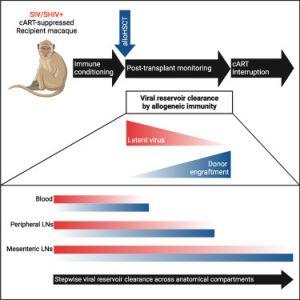In a recent scholarly article, researchers have made efforts to elucidate the phenomenon of HIV remission in at least five individuals following a stem cell transplant (Figure 1). By investigating the transplantation of stem cells in two nonhuman primates affected by the simian form of HIV, the study sheds light on the necessary conditions for a successful cure and provides insights into the sequential clearance of HIV from the body. These findings hold promise for advancing the development of a comprehensive cure for the AIDS-causing virus, bringing scientists closer to their goal.
The initial case of HIV cure through a stem cell transplant was reported in 2009, involving a man who had both HIV and acute myeloid leukemia, a cancer type. The individual underwent a stem cell transplant in Berlin, Germany, and achieved a state of HIV remission. Building on previous research demonstrating the successful transplantation of stem cells in Mauritian cynomolgus macaques, a specific species of monkeys, the current study was conducted using this primate model.
Importantly, the observations made by the scientists regarding the clearance of HIV during the study can be beneficial for physicians in assessing the efficacy of potential HIV cures. Additionally, this newfound knowledge may help elucidate why some patients initially appeared to be cured after receiving transplants but later exhibited detectable levels of HIV. Ultimately, this research contributes to a better understanding of the underlying mechanisms involved in achieving a cure for HIV and brings us closer to realizing the goal of widespread applicability of such a cure.
Journal article: Wu, H.L. et al., 2023. Allogeneic immunity clears latent virus following allogeneic stem cell transplantation in SIV-infected anti-retroviral therapy-suppressed macaques, Immunity.
Summary by Stefan Botha











